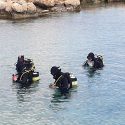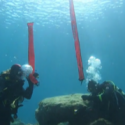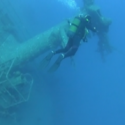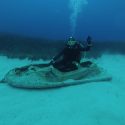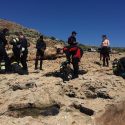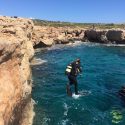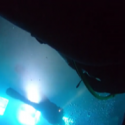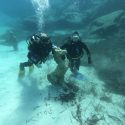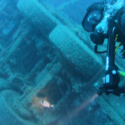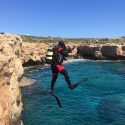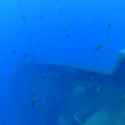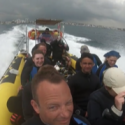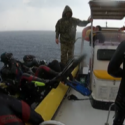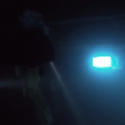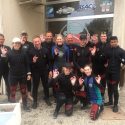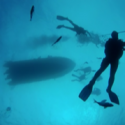1. INTRODUCTION
A total of 12 people participated in a sub-aqua expedition to Cyprus from 30th March to 13th April 2019; 8 Cambridge University Air Squadron (CUAS) students, 3 Diving Instructors and the Officer Commanding CUAS. The expedition was named Exercise BLUE PLUNGE. The exercise was planned, organised and run by the CUAS students.
2. AIM
The primary aim for this expedition was to develop teamwork by placing individuals into an unfamiliar and demanding environment; one where the team needs to be self-sufficient for the Adventurous Training (AT), conduct and safety elements. The expedition sought to broaden and enhance the students’ learning capability, through a rigorous 2-week diving schedule which is designed to challenge the student both physically and mentally in an unfamiliar environment at the same time as progressing skillsets, learning new talents and gaining valuable qualifications.
To succeed individuals would be taught and acquire through training, a skillset encompassing leadership, co-operation, respect, physical courage, understanding and good communication. These attributes will benefit each member in day to day working life and would be especially beneficial to students planning to join the RAF as a future career given the operational and expeditionary nature of military employment.
All individuals would lead events and parts of the expedition to encourage them to exercise their leadership skills. The daily demands of the expedition would involve students and instructors working in small teams in a domain where exemplary communication is required. Individual students with varying skill levels will develop their knowledge in dive planning, dive management and the actual physical skill of operating dive equipment successfully. Dives would be both shore and boat based and would increase in level of difficulty as the expedition progressed. The expedition will operate from the Dive Inn, Larnaca.
An additional aim was for students to work through the British Sub-Aqua Club (BSAC) syllabus, providing newly-qualified Ocean Divers, Sports Divers and Dive Leaders with the necessary experience, knowledge and technical skills required to progress up the qualifications ladder. The squadron’s resident Ocean Diver and Sports Divers (qualifications gained from the previous year’s dive expedition) would act as rescue divers to assist on instructional dives and develop their experience in facilitating training; thus, aiding future squadron expeditions with qualified rescue divers/leaders and rewarding commitment to the RAF and the unit. Additionally, 6 complete novices would be trained to Ocean Diver level, expanding the number of qualified personnel on the squadron. The diving would take place in an array of contrasting environments including; shore, wrecks, reefs, open water and small cavern dive sites either during the day or at night. To complement this practical experience a range of theory lessons would be provided, along with daily learning reviews to ensure immediate improvements are made and proficiency is consolidated.
The benefit such AT gives an individual and the organisation is tremendous – it will equip all members with a greater exposure to ‘real risk’. It will contribute to members developing personal leadership and followership skills which will assist in any life domain but particularly in a future RAF career.
The aims are summarised as follows:
a. Develop individual courage and leadership skills through controlled exposure to risk in a challenging outdoor environment to enhance operational capability.
b. To promote leadership skills and foster team spirit in a challenging and adventurous environment.
c. To train qualified divers as Ocean Divers, Sports Divers or Dive Leaders depending on previous experience and qualifications.
d. To carry out world class diving in a unique and challenging environment.
e. Build experience and further develop divers’ knowledge, skills and proficiency in dive planning, organization and management.
f. Effective communication skills and models will be explored theoretically on land before being observed in the heightened pressure underwater environment.
g. Learning will be related to the participant’s current studies and onto future experiences either in the RAF or public domains.
3. PLANNING
The original planning and organisation regarding this expedition was to Belize and work started in July 2018. With a huge amount of planning completed, the initial military approvals process denied this venue due to some, yet to be fully explained, reasoning. Consequently, we were forced to change venue in late January 19. Rapid re-planning was required and the team got together to decide if changing venue was an option considering the proximity of this information to the planned expedition departure date. After much deliberation and consultations with various diving instructors, Cyprus was chosen as a venue as it could be relatively easily organised and had the potential to deliver most of the aims. Last minute planning resumed and post successful identification of SADS (Diving Instructors) volunteers, the student attendees were chosen by the Officer Commanding. Previous CUAS commitment, contribution, attendance and loyalty were all attributes considered during this selection process. Hand in hand with this work were the applications for financial assistance/grants. Without these generous and tremendously valuable donations such expeditions, training and personal development would not be possible. Unfortunately, again this year we (CUAS) were again unsuccessful with a RAF Sports Lottery grant application as their regulations remain unchanged – UAS students deemed not be eligible. Thankfully however, our application to Ulysses Trust was successful and we were awarded a grant of £1800. As one can imagine, sub aqua activities are reasonably technical and therefore attract a fair amount of cost; hence, this grant from the Ulysses Trust was invaluable as it meant the individual contribution from attendees (who are students with no earnings) could be reduced to acceptable levels to enable the expedition to go ahead.
A phenomenal amount of organising needed to be achieved in a relatively short period now, with daily working/studying cycles also to be adhered to. Under the direction of the Officer Commanding the student attendees arranged a plethora of details including; flight, hire vehicle and accommodation booking, equipment loan (from several sources throughout the UK), purchase of necessary training packs and documentation, compiling detailed itineraries, training schedules, kit lists, applying for clearances, approvals, diving medical appointments and certification. This ongoing process took only 2 months to finalise with several hurdles to overcome but with sound perseverance the team adapted their plan into a workable solution. It must be said that achieving this task in such short notice was testament to many of those skills mentioned earlier already being displayed.
4. SUPPORT
Clearly such an involved expedition requires a huge level of support from external agencies for it to be officially sanctioned and authorised. The Force Development Cell within Headquarters No.6 Flying Training School were exceptionally helpful, as were the Adventurous Training Department in Headquarters No 22 Group. Particular thanks must go to the Travel Cell and
Military transport sections at RAFC Cranwell who rushed through the Flight and Transport request in much shorter timescales than desired. Nonetheless, this expedition would not have succeeded without the financial support from the Ulysses Trust.
Transport. Wizzair airline was utilised for the transport from Luton to Larnaca airport. On arrival, the Officer Commanding and Instructors collected the hire vehicles and transported all staff and students to the accommodation. The vehicles were 4×4 variety to enable access to the more remote (off-road) dive sites.
Accommodation. The expedition was accommodated in self-catering apartments located in Larnaca a short drive from the Dive In Centre. Personnel were allocated 4 x 3-man rooms; sparsely accommodated with 2 x beds and one sofa bed with a small kitchenette to facilitate cooking.
Food. All meals were self-catered with 2 CUAS students overseeing all sourcing, purchase and cooking instructions. A fine student effort was displayed, with some creative menus – all personnel cooked and ate well for the duration of the expedition.
5. ACHIEVEMENTS
Despite not having had the availability of nearby swimming pools and local dive centres in the UK beforehand to practice drills and gain initial familiarisation with the diving equipment, the diving progressed extremely well in week 1. The communal areas of the hotel were heavily utilised during the first 2 days to ensure all novice divers were completely familiar with all equipment and that all initial theory was completed. Excellent efforts from both instructors and students ensured that by the end of week 1, all 6 novice divers were awarded their Ocean Diver status post successful waterborne test and theory test. Now ahead of schedule and due to a 2-week (rather than the normal 10-day) exped timeframe; we (the instructors) recognised the opportunity to further the student training and embark on the Sports Diver syllabus. It would be tight to achieve the entire syllabus by the end of the expedition; however, we decided it was definitely worth the additional workload. Morning and evening lectures continued throughout the second week with all personnel progressing very well. In the second week we took advantage of the Dive In boat and travel to the wreck of the Zenobia just outside Larnaca harbour. Despite the additional cost, this was a phenomenal dive site (wreck) enabling us to increase the challenge and further progress students’ skills. All additional efforts were rewarded on the penultimate day when all students graduated to the next level.
The expedition culminated with a total of 231 dives and 7207 minutes underwater being achieved. 6 Ocean Diver, 7 Sports Diver (6 awarded the Sports Diver in week 1) and 2 Dive Leader qualifications were awarded. This was a tremendous achievement and surpassed all expectation. All training was delivered in accordance with the BSAC syllabi and expedition aims. There were no diving incidents during the expedition.
Training. Training was one of the primary aims of the expedition. Six complete novices were trained to and completed the BSAC Ocean Diver qualification; these individuals then progressed along with one existing Ocean Diver and were awarded the Sports Diver qualification. Another student and the Officer Commanding were awarded the BSAC Dive Leader qualification and progressed towards the BSAC Open Water Instructor qualification – a massive success. On the non-diving days (mandatory off-gassing’ periods) students and staff conducted historic, cultural and operational visits learning about the island’s history, culture and visiting RAF Akrotiri to experience the current operational tempo of an active and vibrant military unit.
6. CONCLUSION
Despite the late notice change of venue and some complications regarding flights and vehicle hire, coupled with lack of pre-expedition pool training, Exercise BLUE PLUNGE exceeded all expectations. It was a resounding success and achieved more than its original aims. This expedition has introduced several novices to sub-aqua adventurous training and developed the skills of the more experienced expedition members. The nature of sub-aqua activities, reliance on equipment etc. brought several issues to the attention of the students, such as the importance of looking after one’s equipment properly, being attentive to detail and teamworking to achieve a goal. It taught about the need for robust planning and anticipation of potential incidents early in the diving careers of expedition personnel. Expedition members also gained an understanding of military deployed operations through interaction with the military and civilian personnel involved with this expedition from planning to completion. The skillset developed throughout the entire expedition process sets a fine grounding for the younger generation of future residents and leaders of the UK (military and civilian). These immensely valuable traits would be difficult to gain by non-adventurous training means. Without the support of organisations like the Ulysses Trust this phenomenal achievement would not be possible.
EXERCISE BLUE PLUNGE – STUDENT DIARY
Day 0 – Fri 29th March
Everyone arrived at RAF Wittering to delegate kit and ensure everyone had the correct equipment and enough space in baggage. All forms and documents were checked by the Officer Commanding.
Day 1 – Sat 30th March
MT picked everyone up at 0200 and drove us to Luton airport for a 0620 flight. We landed in Cyprus around 1130 with no problems boarding or collecting luggage. After collecting 3 hire cars we drove to our accommodation – Sea and Lake Apartments. We dropped baggage off and went for lunch. A group then went shopping to buy food for the next couple of days. At 1800 we had a brief about the plan for the next week and we were required to fill out some medical forms. For dinner we cooked Bolognese.
Day 2 – Sun 31st March
The novices (Luke W, Rosa, Luke I, Kathryn, Rahul, Olivia) were taught all of the Ocean Diver syllabus theory – the first three lessons given by Rob and the second three by Ken in the afternoon. Alex and Pippa dived the Zenobia twice with Ken, the Boss and Sam where they checked out the upper cargo bay and accommodation area. They returned at 1400 for a packed lunch and Alex went shopping in the afternoon while the novices were still having lectures. For dinner we had chicken curry.
Day 3 – Mon 1st April
The novices went to collect some equipment such as cylinders and weights from the dive centre and went back with Ken who went through all the kit and equipment. Quite a lot of time was spent sorting out wetsuits before going in the pool and practising breathing underwater for the first time and finning. After lunch, Ken had brought more lead back from the dive shop as many of the novices couldn’t get to the bottom of the pool as they were too buoyant. Retrieving your DV and mask clearing drills were then taught. The more experienced divers did another two dives to the Zenobia and Alex lost both his torch and group, before Rob showed him the right direction. The novices took their Ocean Diver exam at 1630 and all passed with either 97 or 100%. A few students played cards after pesto and chicken pasta for dinner.
Day 4 – Tues 2nd April
We met at 08:00, and drove to dive centre to collect kit, then drove to Green Bay, where the novices had their first dives in the sea and first glimpses of fish. The novices practised drills such as mask clearing in sheltered water, while Pippa, Alex and the Boss went to deeper, unsheltered waters to see the sunken statues and practise leading dives and using DSMBs (delayed surface marker buoys). Everyone dived twice, in two waves each time, and Pippa recorded the log information for the first wave. We then took our kit back to the dive centre and washed it. The rest of the day was taken up by food shopping and eating dinner together.
Day 5 – Wed 3rd April
After getting up for 07:45, we went back to Green Bay dive site for the morning. The novices went deeper to see the statues and practise drills from the previous day, while the more experience divers did more practise with DSMBs. We then drove along to Cape Greco dive site, where we had to fall backwards off a ledge in order to enter the water, and we exited through a blowhole in a cave. It was the novice’s first proper experience of unsheltered water and swimming further with less stops for drills. In the evening some of the group met in the hotel for card games.
Day 6 – Thurs 4th April
After meeting at 07.45, we headed to the dive centre and picked up our kit, with everyone excited to do further depth progression. We then headed to Calypso Cave dive site, which was about a 50 minute drive away. We kitted up and the first wave went in the water, where they practiced controlled buoyant lifts and the use of alternate air sources. They also went down to 18m, where there was a jet ski. The second wave did dive leader drills as well, such as controlled buoyant lifts and tows. They even managed to see a turtle. Having only been a third of the way through the experience, it was amazing to see how far everyone had come. After heading back and washing our kit, the students went out for a meal, followed by ice cream. It was a real chance for the group to bond.
Day 7 – Fri 5th April
Today was the day when the novices were to complete their ocean diver course, following successful diving of one of the most famous wrecks in the world, the Zenobia. The others who had dived it earlier in the week informed those new to it of its beauty and how to navigate it, and then we headed down. For the first dive, everyone went through the upper cargo deck, shining the torches to observe the lorries below. After a brief surface interval back on land, we headed out – everyone working together to run operations smoothly. Just as people were headed in for the second dive, the heavens opened and we were greeted with a thunderstorm. It was here that the true grit and determination of the team came together as we helped each other to quickly kit up and get in to avoid the rain. The newly qualified ocean divers buddied up and navigated the wreck by themselves, heading through the upper cargo deck again which was a daunting but rewarding experience. Meanwhile, the dive leader trainees passed through the Zenobia accommodation, before practicing DSMB deployment. We then returned to our apartments and began our sports diver and continued with our dive leader theory lessons. Following this, we had a whole exped meal at an authentic Cypriot restaurant – a lovely place to catch up on the day of diving and to celebrate achieving the qualifications.
Day 8 – Sat 6th April
Another full day of diving, progressing to diving in buddy pairs without an instructor at Calypso Cave. The purpose of the morning’s dive was to familiarise ourselves with the underwater environment unsupervised. This meant appointing a dive leader in the buddy pair who was responsible for delivering a SEEDS brief, reporting to the dive manager and ensuring competent buddy (BAR) checks were carried out. Alex and Katherine had a very successful dive, utilising their navigation and piloting knowledge taught to them on previous days to find their way to the sunken jet ski and back, including seeing a stingray en route! Another two waves of dives took place to ensure everyone was competent in their skills for their respective qualifications – the dive leaders deploying DSMBs while the beginners practiced their piloting skills. The afternoon had CPR lessons in store for the first wave. This was a useful exercise in how to manage a drowned casualty on land and how to rescue an unconscious diver at the surface. This culminated in a mock casualty exercise, where the dive leaders practiced their skills in managing the rescue situation.
Day 9 – Sun 7th April
A day of rest to recuperate after a busy week of diving. Most of the day was taken up with administration and ensuring our kit was clean, tidy and all accounted for. The afternoon was taken up by Sports Diver lecture 4 for the beginner group and dive leader training concurrently. This lecture included teaching on how to use dive tables to calculate tissue codes on return from dives. Another skill learnt was how to calculate the rest time required between consecutive dives and how altitude affects the likelihood of suffering a DCI. The students went for a walk on the Larnaca front to clear our heads after the maths lesson!
Day 10 – Mon 8th April
Today we went to Sheep Dip dive site for the Rescue part of the Sports Diver course. The first and second waves practised using an SMB, and then performed a simulated unconscious casualty scenario with rescue breaths on their return. There was a short lunch in between, with some great sandwiches and a friendly stray dog for company. The afternoon consisted of a similar set-up, but this time each Ocean Diver had a DSMB to deploy at 10m. This was managed with no major problems, as any that were pulled out of grasp on being deployed were quickly recovered. All in all, a very successful day topped off with some theory lessons in the evening.
Day 11 – Tues 9th April
Another very exciting day. The divers went to the Zenobia, exploring the upper cargo deck, and some divers had a chance to explore the middle deck as well. We had a break in between with some hot chocolate to warm up. The afternoon waves started promptly at midday, following a similar structure. This time a few buddy pairs went off on their own to do some exploring and picture-taking. All made it back in one piece! The evening was kicked off by the sports diver theory test, with everyone passing first time with (mostly) flying colours.
Day 12 – Wed 10th April
We went to Tunnels and Caves dive site again for some more skills and drills work as well as a little bit of exploration. We worked with DSMBs in the morning and in the afternoon practiced using a distance line to mark out our path. The weather got fairly choppy today and gave us some good practice leaving the water in poor conditions by the “beaching” method. We also got to enter the water via the giant stride and forward roll methods from rocks overlooking the sea.
Day 13 – Thurs 11th April
Final day of diving and beautiful weather for exploring the Zenobia. In the morning half of the group went without an instructor, carrying out a previously demonstrated route through the middle cargo deck and down to the bridge. The second half of the group went through the middle cargo deck and into the accommodation, before returning to the surface. In the afternoon all of the students went with Ken to see the propellers and the lorry full of animal bones by the stern, before proceeding through the upper cargo deck and up to the surface.
Day 14 – Fri 12th April
As today was our rest day before flying home, members of the squadron found different activities to do. Some travelled to RAF Akotiri with one of our diving instructors, where he shadowed the Royal Engineers who were in the process of building a temporary vertical landing pad for the F35 Lightening II aircraft. They also learnt about life on an operational base and how it may differ from activities back in the UK. Other students travelled to Aiya Napa where they were able to enjoy a final day exploring a little more of Cyprus before returning home. We all spent the afternoon sorting dive kit, ensuring that everything was accounted for and distributed accordingly within the group.
Day 15 – Sat 13th April
This morning everyone was busy packing and tidying before our flight at 1400. After cleaning the MT vehicles and the apartments, everyone loaded their kit and we bid farewell to our hosts. Once we arrived at the airport and returned the vehicles, we manged to make our way through check-in and security with ease for an on-time departure. Once in the UK, we parted ways with our instructors and headed back to RAF Wittering, dropping some students at Cambridge on the way.
Ex Blue Plunge was a huge success with a total of 231 dives between the group and 15 qualifications being gained (6 Ocean Diver, 7 Sports Diver & 2 Dive Leader). From this expedition we were able to significantly improve our planning and briefing capabilities, we enhanced our teamwork both in and out of water, and every single member was able to challenge themselves to go beyond what they initially thought they were capable of at the beginning of the expedition.
WHAT I LEARNED FROM EXERCISE BLUE PLUNGE
Officer Cadet Rosa Fitt-Conway
“I had never previously done anything involving breathing underwater, not even snorkelling, so even being 30cm deep in pool water and breathing seemed very unnatural, yet by the end of the exped I was 30m beneath the surface of the sea and it felt almost normal. Being able to transition from an environment where you can stand up and take a breath of fresh air to one where the surface may take minutes to reach was mostly a matter of confidence in your own abilities and trust in the buddy you were paired with. The time we spent learning diving theory, practicing our skills and working together in a group helped to build both.
“However, it was not only the breathing that was hard to master. At the start of the exped I found mask-clearing drills particularly difficult to do, since I disliked opening my eyes underwater and the possibility of water going up my nose. The instructors were very patient and helped me realise that by taking it in steps and increasing the difficulty little by little, it was not such a hard task after all.
“The drills we undertook on dealing with problems were extremely helpful for building confidence. When my buddy and I found ourselves facing four different problems at once during a dive in the second week, we were able to calmly sort each in turn, with no help or advice from the instructors.
“Aside from the diving itself, there was also much to be learned from the overall experience. Organisation skills were particularly important, especially when diving the Zenobia, as we needed to be ready by a fixed time every morning. We also needed to keep the records of our dives up to date throughout the two weeks. As time progressed, we became more efficient in getting kit on and off, making the diving process run much more smoothly.
“One thing I particularly noticed on this exped, since I struggled with various things such as carrying cylinders or working up the nerve to stride off a small cliff into the sea, was the importance of encouragement. The other group members were very supportive and this allowed me to overcome the difficulties I had, and I attempted to do the same for them by continually checking in with my buddy when underwater, and the rest of the group when on the surface, for instance when others were feeling cold.
“Overall, I feel that I have learned an awful lot from this exped, not only about how to dive, but also about overcoming challenges and supporting teammates. This is not an opportunity that I could ever have expected to have and not one that would be offered elsewhere, so I am very grateful that I was able to experience such an activity through CUAS. I am also thankful to the other people on the exped, who made it such an enjoyable learning environment.
“I made a list of areas that I have learned new skills / developed in:
Leadership
– Setting a good example (staying positive)
– Looking after your team (food, water, buddy checks)
– Maintaining morale
Teamwork
– Pushing your teammates (but not too far)
– Responsibility to stay positive (needed for morale of the team)
– Trusting your leaders (even when you doubt yourself)
Personal Development
– How I react to pressure and the unknown
– The difference between my mental and physical limits
– The value of good leadership and having a strong team
– The importance of not giving up
– The importance of preparation and training“In summary, the skills I have learned in a very short time period because of the nature of this expedition have given me the confidence, ability and enthusiasm to strive to better myself in whatever I do. I am extremely grateful for everything the UAS organisation has given me and undoubtedly I am a better individual for it.”
This outcome could not have been achieved without the support (especially financial) of external organisations such as the Ulysses Trust. My wholehearted thanks go to them and all the others.

